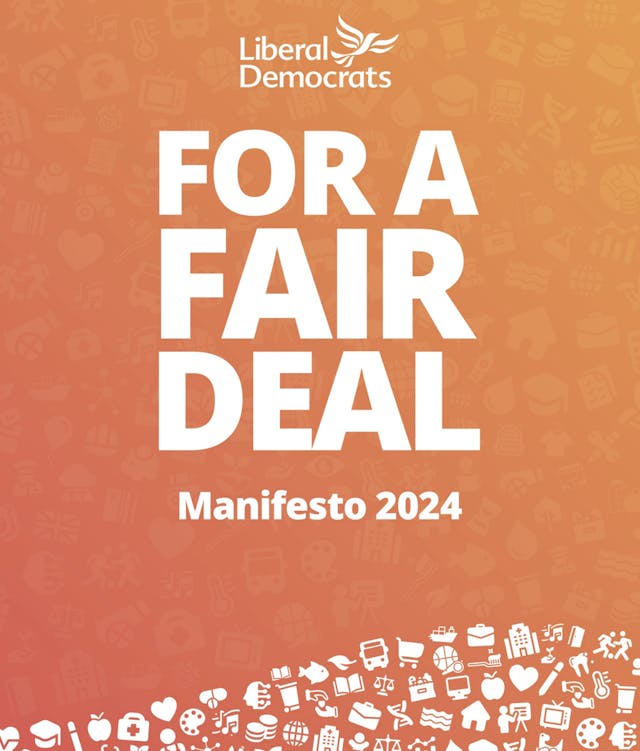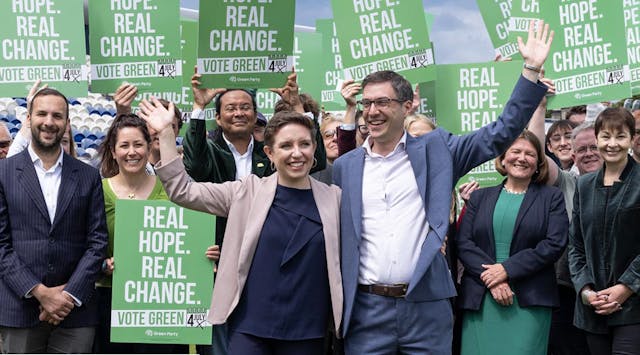What do the UK election manifestos offer the creative industries?
Labour manifesto targets creative industries through education and business, while Tories and Liberal Democrats announce broad pledges.

Labour leader Keir Starmer / Labour
The creative industries have been cited in the manifestos of all three leading parties, albeit in a fairly reductive manner, with TV, gaming and music mentioned by each and Labour offering slightly more nuance.
Labour has based its approach on an existing document, Creating Growth: Labour’s plan for the arts, culture and creative industries, which is referenced throughout its manifesto and is where the detail is.
Insulated within a manifesto that’s concerned with growth, business and wealth creation, Labour’s mentions of the creative industries dovetail with the party’s Industrial Strategy plan, which will see the formation of an Industrial Strategy Council featuring regional, business and trade union representation, it says.
Explore frequently asked questions
Creative education could earn a reprieve under Labour
Education is generally signposted with headline claims such as recruiting 6,500 new teachers in ‘key subject areas.’
Given that creative subjects have been neglected by successive Tory governments from school age through to further education, it’s notable that the Labour manifesto hints at some kind of redressal. It says: “Every child should have a broad curriculum with an excellent foundation in reading, writing and maths and support to develop essential digital, speaking and creative skills.” A review of the national curriculum and assessment is also promised.
It states further: “Culture is an essential part of supporting children and young people to develop creativity and find their voice. There is huge potential for growth in the creative industries that benefit every corner of the UK.”
There’s also a declarative line that suggests: “Labour will support children to study a creative or vocational subject until they are 16 and ensure accountability measures reflect this.”
There’s a slightly incongruous celebrity endorsement within the manifesto from actress Imelda Staunton, who “welcomes” the proposals and says: “Opening up access to creativity in our schools is critical, not just so that our children have a better chance at a career in the arts, but because access is what will fuel growth in the creative industries.”
You won’t find much granular detail in any of these manifestos, particularly around how plans will be rolled or paid for, so the statements represent intentions at best.
All the parties have latched on to the film, music and gaming industries, flagging them as important. Labour promises to “create jobs” and “accelerate growth” in these areas.
Advertisement
Public service broadcasting still on chopping block
While it’s easy for all parties to crow about the value of the British film industry, public service broadcasting has become a real political issue in recent years as the BBC, in particular (but also Channel 4), faces an existential threat around the perceived value for money of the license fee.
Labour makes a vague promise to “work constructively with the BBC and our other public service broadcasters so they continue to inform, educate and entertain people and support the creative economy by commissioning distinctively British content,” which appears to be a fairly neutral statement in comparison to the Tory manifesto’s promise to “carefully consider the findings of the Funding Review ahead of the next Royal Charter and ensure it [the BBC] upholds these principles [of diversity of thought, accuracy and impartiality].” The BBC will also be subject to a new complaints process under the Tories.
The Liberal Democrats’ BBC take is that it would “support” the BBC in tackling fake news and encourage the organization to take a leading role in educating all generations on tackling fake news.
Meanwhile, other Labour mentions of the creative industries are rather brief but include the formation of a National Music Education Network and national museums and galleries being encouraged to share works with smaller UK institutions. Easier access to startups and small enterprises is also mentioned and there seems to be an emphasis on promoting regional creative economies.
Advertisement
The creative industries as an export
There is, however, an acknowledgment of the British creative industries as an export, specifically a promise to “work across government to bring leading creative and cultural institutions together to increase the UK’s international clout” and work with diaspora communities to improve cultural links across the world.

Flag waving for film, TV and gaming
Apprenticeships, which are a feature of the Labour manifesto, appear in the Tory manifesto in tandem with the creative industries. The party state: “We believe apprenticeships are a key pipeline of talent into our world-leading creative industries.
“We will work with industry to deliver a dedicated flexible coordination service so that everyone who wants to work in the film, TV, gaming and music sectors can work on live productions while benefiting from at least 12 months of secure training. We will ensure our creative sector tax incentives remain competitive.” The aim of the manifesto as a whole seems to be an attempt to woo voters with tax cuts.
That’s about it when it comes to mentions of the creative industries. The only other thing to note from the Tories is its vague assertion: “We will ensure creators are properly protected and remunerated for their work while also making the most of the opportunities of AI and its applications for creativity in the future.”
It also aims to speed up the national rollout of 5G and high-speed broadband, which may benefit digital and creative industries.
Like Labour, the Tories seem to be proposing support for the export of British creative endeavors through trade deals and marketing campaigns.

The Liberal Democrats groups its creative industries pledges into the departmental section Culture, Media and Sport and says it aims to establish “creative enterprise zones to grow and regenerate the cultural output of areas across the UK.”
Creative Europe nods to plans for European support
In a bid to boost funding for cultural and creative projects, it says it will apply to participate fully in Creative Europe, which is a funding program established by the European Union.
In terms of education, the Liberal Democrats, does cite creativity as a core skill, which is part of a plan to “broaden the curriculum.”
Suggested newsletters for you
Gambling advertising under scrutiny
It may be of interest to ad agencies that there’s a plan to combat the harms caused by gambling, with the Liberal Democrats vowing to introduce the planned compulsory levy on gambling companies to fund research, prevention and treatment.
The plan also stipulates “restricting gambling advertising,” establishing a gambling ombudsman and implementing effective affordability checks.
All parties target HFSS
It seems that across the parties there is support to continue to clamp down on the restrictions around promoting products that are high in fat, salt and sugar (HFSS). The Tories want to curb multi-buy deals, Labour is looking at advertising restrictions targeting children, while the Liberal Democrats takes a similar line.
AI pledges look to balance growth and ethics
All parties have laid out platitudes on AI, which loosely assert to encourage the opportunities it brings while clamping down on its harmful side. The Tories have weighed heavily on growth and investment in the sector, while Labour asserts balancing growth with protection for workers across sectors and the formation of a Regulatory Innovation Office. The Liberal Democrats’ manifesto also points towards growth, ethics and regulation.

While the Green Party doesn’t make many direct references to the creative industries, it is promoting access to the arts and affordability, the importance of creating jobs within the arts and giving local authorities the tools to promote grassroots participation in cultural activities.
Across the board, it’s really music, gaming and TV that steal the attention of the parties in their manifestos. Emerging technology comes up, tech skills and digital infrastructure, while creative education looks to be a key battleground, but you won’t find a single mention of the design and advertising industry anywhere.
What may be of most interest to creative businesses is what the parties aim to do to back them. With Labour claiming to be pro-growth, the Conservatives pro-business, the Liberal Democrats offering something similar and The Green Party focusing on access to the arts and agency for workers, creative business owners will have to think about what they really want.

